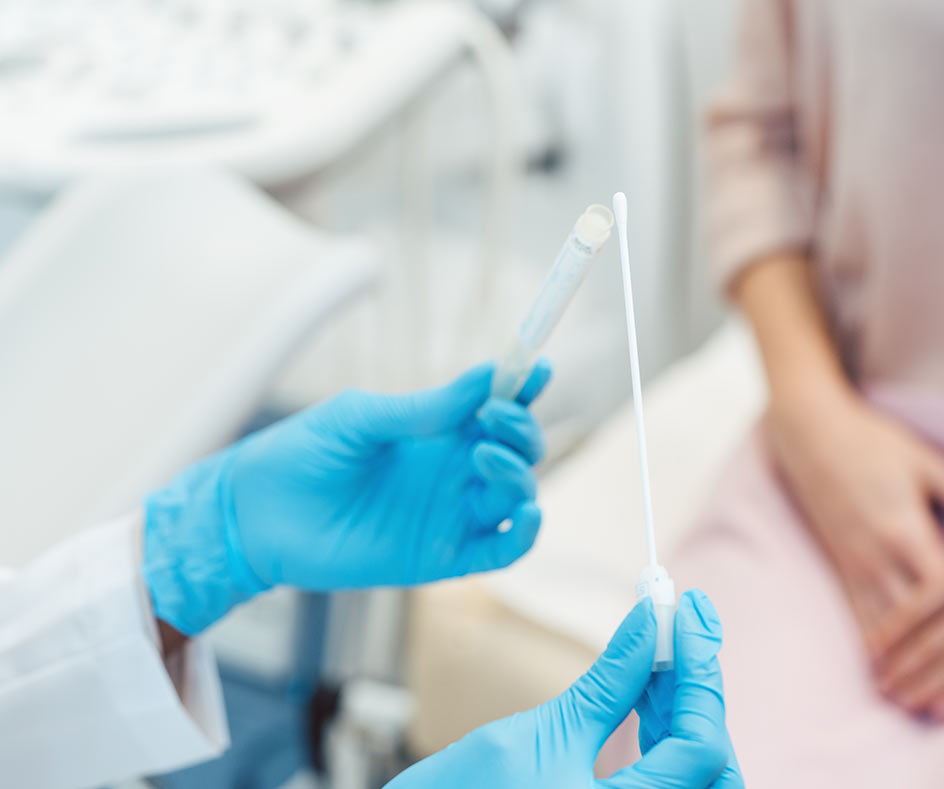Located at 20 Old Brompton Road – Just Steps from ![]() South Kensington Tube. Easy Access, Always.
South Kensington Tube. Easy Access, Always.
Our gynaecology specialist at GP London Clinic provide cost effective Pap smear test also called a Pap test or Cervical Screening. We will perform your private Pap smear test in a relaxed and comfortable environment.
A Pap test detects sudden changes in the cervical cells, which may become cancer if left untreated. After a cervical screening at GP Clinic London, you will receive your result through an email within two weeks. The screening will also check for high-risk HPV strains.


It is best to undergo your smear test when you aren’t on your period. Being on your period will make your cervical cell sample unclear, giving an inconclusive result. Taking the smear test halfway through your cycle will prevent an inconclusive result.
Avoid using spermicidal products, including condoms with spermicidal lubrication and having sex 24 hours before your smear test, as they may affect your results.
A Pap smear appointment takes about 10 minutes, but the test will last only 1 – 2 minutes. Our specialist doctor will perform the test while ensuring that you are comfortable. You may feel slight discomfort as the doctor opens your vagina with a speculum to view the cervix.
After opening the vagina, the doctor will use a small brush to collect cervical cells. This shouldn’t cause pain or discomfort. Our doctors are experienced and will ensure you feel comfortable during your exam.

You can go about your normal activities following your Pap smear. You may experience slight bleeding after the procedure, but this is normal. If you experience excessive bleeding or severe pain after the procedure, ensure you contact us immediately.
If your Pap test result is abnormal, you may need further testing, such as colposcopy, for 3 – 6 months during your pregnancy. Sometimes, you can delay the Pap smear until the baby arrives. Our doctor will advise you on the most suitable option.

You will receive the result of your Pap smear in a letter that the doctor will review. About nine in ten smear test results are accurate.
If your Pap test result is normal, you will return for your routine screening after three or five years, depending on your condition and age.
In some cases, the result is inconclusive due to an insufficient or unclear cell sample. This result may occur if you have an infection, and another Pap test after three months is necessary.
| Result | What it means |
|---|---|
| Irregular with borderline or low-grade cervical cell changes | If HPV isn’t present, the doctor will recommend another screening after three or five years. If HPV is present, you will need a colposcopy |
| Unusual with higher-grade cell changes | Colposcopy is necessary |
| Positive for HPV with no cell changes | Another screening within one year is necessary to check if the HPV has cleared. If you have this result in three subsequent tests, a colposcopy is necessary |
| Positive for HPV with cell changes | A colposcopy is necessary |

You can visit GP London for your routine cervical screening or call us on 020 7043 4317 to book an appointment for your Pap smear.
A Pap smear doesn’t screen for fungal or bacterial infections such as candida or BV. This test usually screens for HPV-related cervical cell changes.
Yes, you do. Your routine smear test is important whether you are having sex or not. A Pap smear will detect sudden cervical cell changes that may develop into cervical cancer if left untreated. These changes often result from HPV infection.
HPV infections are quite common and often spread through sexual intercourse. Most women contract HPV at some point in their life, but in most cases, the body fights off the infection, leaving no trace of the virus. You can identify sudden cervical cell changes from HPV infections with a Pap smear.
If you are sexually active, regular Pap smears are also important. In some women, the virus stays dormant, leading to abnormal cells. Routine screening can identify these abnormal cells.
Different treatments are available that either destroy the abnormal cells or destroy the cervix area with the cells.
The doctor recommends a colposcopy exam if the Pap test shows moderate cell changes. A biopsy may be necessary if the colposcopy shows an area of your cervix has abnormal cells. The specialist will send the unusual tissues to the lab for testing.
Depending on the result, you will need treatment to destroy or remove the cells. A common treatment is the loop diathermy or large-loop excision of the transformation zone (LLETZ). This method requires a wire loop passed through an electric current to remove the cells.
This treatment requires local anaesthesia, but you can opt for general anaesthesia. Other treatments for destroying abnormal cells are cryotherapy or freezing, laser therapy and cold coagulation.